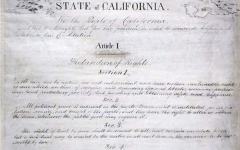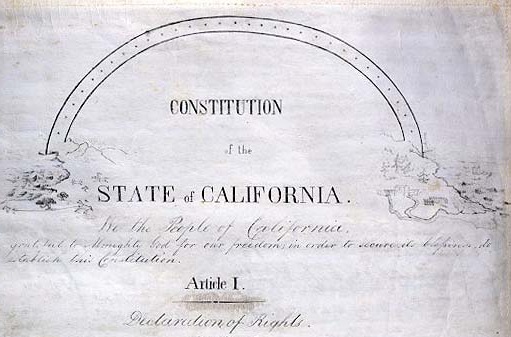
California Supreme Court (Photo: public domain)
Frequently Asked Questions about California Constitution Article VI
Who is given the judicial power of the state?
By Chris Micheli, May 23, 2024 2:30 am
How many sections does Article 6 have? This article contains twenty-three sections.
What does Article 6 relate to? It relates to the judicial branch of state government.
Who is given the judicial power of the state? Section 1 provides that the judicial power of the state is vested in the Supreme Court, courts of appeal, and superior courts, all of which are courts of record.
Who composes the state supreme court? Section 2 provides that the Supreme Court consists of the Chief Justice and 6 associate justices and the agreement of four judges present at the argument is necessary for a judgment.
How do the courts of appeal operate in California? Section 3 provides that the Legislature must divide the state into districts with each containing a court of appeal with one or more divisions and that each division consists of a presiding justice and 2 or more associate justices. Agreement of two judges present at the argument is necessary for a judgment.
Who provides for the state’s trial courts? Section 4 provides that, in each county of the state, there is a superior court of one or more judges and the Legislature prescribes the number of judges and provides for the officers and employees of each superior court.
How are superior courts operated in this state? Section 4 provides that, in each superior court, there is an appellate division and that the Chief Justice assigns judges to the appellate division for specified terms.
Who comprises the Judicial Council in California? Section 6 provides that the Judicial Council consists of the Chief Justice and one other judge of the Supreme Court, three judges of the courts of appeal, 10 judges of the superior courts, two nonvoting court administrators, and any other nonvoting members as determined by the voting membership of the council, each appointed by the Chief Justice for a three-year term pursuant to procedures established by the council; four members of the State Bar appointed by its governing body for three-year terms; and, one member of each house of the Legislature appointed as provided by the respective house.
Who staffs the Judicial Council? Section 6 provides that the Council appoints an Administrative Director of the Courts, who serves at its pleasure and performs functions delegated by the Council or the Chief Justice, other than adopting rules of court administration, practice and procedure.
Who comprises the Judicial Appointments Commission? Section 7 provides that the Commission on Judicial Appointments consists of the Chief Justice, the Attorney General, and the presiding justice of the court of appeal of the affected district or, if there are 2 or more presiding justices, the one who has presided longest or, when a nomination or appointment to the Supreme Court is to be considered, the presiding justice who has presided longest on any court of appeal.
Who comprises the Judicial Performance Commission? Section 8 provides that the Commission on Judicial Performance consists of one judge of a court of appeal and two judges of superior courts, each appointed by the Supreme Court; two members of the State Bar of California who have practiced law in this State for 10 years, each appointed by the Governor; and, six citizens who are not judges, retired judges, or members of the State Bar of California, two of whom to be appointed by the Governor, two by the Senate Committee on Rules, and two by the Speaker of the Assembly.
What is the State Bar? Section 9 provides that the State Bar of California is a public corporation and that every person admitted and licensed to practice law in California is a member of the State Bar, except while holding office as a judge of a court of record.
Who presides over habeas corpus actions? Section 10 provides that the Supreme Court, courts of appeal, superior courts, and their judges have original jurisdiction in habeas corpus proceedings.
Which courts have original jurisdiction in specified matters? Section 10 states that all of the courts also have original jurisdiction in proceedings for extraordinary relief in the nature of mandamus, certiorari, and prohibition. Superior courts have original jurisdiction in all other causes.
Who reviews death penalty sentences? Section 11 provides that the Supreme Court has appellate jurisdiction when judgment of death has been pronounced.
Who determines the civil case jurisdiction? Section 11 specifies that, when appellate jurisdiction in civil cases is determined by the amount in controversy, the Legislature may change the appellate jurisdiction of the courts of appeal by changing the jurisdictional amount in controversy.
Can the state Supreme Court transfer certain cases? Section 12 provides that the Supreme Court may, before decision, transfer to itself a cause in a court of appeal. It may, before decision, transfer a cause from itself to a court of appeal or from one court of appeal or division to another. In addition, this section provides that the Supreme Court may review the decision of a court of appeal in any cause.
What is the test for a trial court error to result in some form of reversal? Section 13 provides that no judgment may be set aside, or new trial granted, in any cause on the ground of misdirection of the jury or of the improper admission or rejection of evidence, or for any error as to any matter of pleading, or for any error as to any matter of procedure, unless, after an examination of the entire cause, the court is of the opinion that the error complained of has resulted in a miscarriage of justice.
How is a court opinion determined to be published? Section 14 provides that the Legislature must provide for the prompt publication of the opinions of the Supreme Court and courts of appeal as the Supreme Court deems appropriate and those opinions must be available for publication by any person.
What are the requirements for being a judge in this state? Section 15 provides that a person is ineligible to be a judge of a court of record unless for 10 years immediately preceding selection that person has been a member of the State Bar or served as a judge of a court of record in this State.
What are retention elections for appellate judges? Section 16 provides that judges of the Supreme Court are to be elected at large and judges of courts of appeal must be elected in their districts at general elections at the same time and places as the Governor. Their terms are 12 years beginning the Monday after January 1 following their election.
What are the elections for trial court judges? Section 16 provides that judges of superior courts are to be elected in their counties at general elections. For vacancies, the Governor fills vacancies in those courts by appointment. A nomination or appointment by the Governor is effective when confirmed by the Commission on Judicial Appointments.
What is a judge prohibited from doing? Section 17 provides that a judge of a court of record may not practice law and during the term for which the judge was selected is ineligible for public employment or public office other than judicial employment or judicial office.
Are there exceptions to outside employment prohibitions for judges? Section 17 specifies that a judge of a court of record may accept a part-time teaching position that is outside the normal hours of his or her judicial position and that does not interfere with the regular performance of his or her judicial duties while holding office.
When is a judge disqualified? Section 18 provides that a judge is disqualified from acting as a judge, without loss of salary, while there is pending (1) an indictment or an information charging the judge in the United States with a crime punishable as a felony under California or federal law, or (2) a petition to the Supreme Court to review a determination by the Commission on Judicial Performance to remove or retire a judge.
How is a judge disqualified? Section 18 specifies that the Commission on Judicial Performance may disqualify a judge from acting as a judge, without loss of salary, upon notice of formal proceedings by the commission charging the judge with judicial misconduct or disability.
When is a judge suspended? Section 18 states that the Commission on Judicial Performance must suspend a judge from office without salary when in the United States the judge pleads guilty or no contest or is found guilty of a crime punishable as a felony under California or federal law or of any other crime that involves moral turpitude under that law.
What is the jurisdiction of the Judicial Performance Commission? Section 18.1 provides that the Commission on Judicial Performance must exercise discretionary jurisdiction with regard to the oversight and discipline of subordinate judicial officers, according to the same standards, and subject to review upon petition to the Supreme Court.
What must the Judicial Performance Commission provide? Section 18.5 provides that, upon request, the Commission on Judicial Performance must provide to the Governor of any State of the Union the text of any private admonishment, advisory letter, or other disciplinary action together with any information that the Commission deems necessary to a full understanding of the Commission’s action with respect to any applicant whom the Governor of any State of the Union indicates is under consideration for any judicial appointment.
Who provides for judges’ compensation? Section 19 provides that the Legislature must prescribe compensation for judges of courts of record.
Who provides for judges’ retirement? Section 20 provides that the Legislature must provide for retirement of judges of courts of record for age or disability.
Are temporary judges permitted? Section 21 provides that, upon stipulation of the parties, the court may order a cause to be tried by a temporary judge who is a member of the State Bar, sworn and empowered to act until final determination of the cause.
Are subordinate members of the judiciary permitted? Section 22 provides that the Legislature may provide for the appointment by trial courts of record of officers such as commissioners to perform subordinate judicial duties.
- Lis Pendens in California - February 14, 2026
- Scope of International Commercial Arbitration - February 14, 2026
- Eminent Domain Law - February 13, 2026



